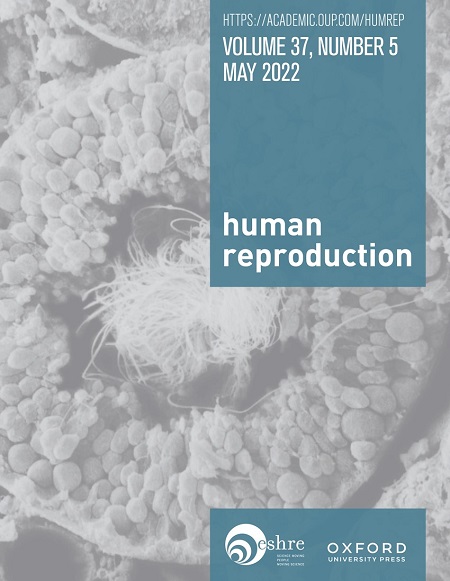The experience of transfeminine adolescents and their parents regarding fertility preservation via testicular sperm extraction (TESE): a qualitative study.
IF 6
1区 医学
Q1 OBSTETRICS & GYNECOLOGY
引用次数: 0
Abstract
STUDY QUESTION How do transfeminine adolescents and their parents experience fertility preservation via testicular sperm extraction (TESE)? SUMMARY ANSWER Participants experienced the TESE process positively when provided with appropriate guidance to navigate the decisional dilemma between preserving future biological parenthood and the pressure to start puberty suppression early. WHAT IS KNOWN ALREADY Sperm banking through ejaculation is not feasible for all transfeminine adolescents due to genital dysphoria and early puberty; for this group, TESE is the only alternative. However, during early puberty, they must postpone or pause puberty suppression until spermatogenesis is fully developed. STUDY DESIGN, SIZE, DURATION All consecutive TESE patients in our centre and their parents were invited to participate. Between December 2022 and May 2023, we included 6 adolescents and 10 parents. We used a qualitative approach based on semi-structured interviews to study the experience of the transfeminine adolescents and their parents. PARTICIPANTS/MATERIALS, SETTING, METHODS Transfeminine adolescents diagnosed with gender dysphoria in early puberty (Tanner stage ≥2) who underwent TESE before the start of puberty suppression or gender-affirming hormones participated in this study. The interviews were recorded, manually transcribed and analysed using reflective thematic analysis focusing on understanding the participants' experiences of puberty and fertility preservation and the various factors and social processes influencing their decision to undergo TESE. MAIN RESULTS AND THE ROLE OF CHANCE Transfeminine adolescents decide to undergo invasive fertility preservation because of a possible, future desire for parenthood. Parents stressed the importance of preventing future decisional regret. They both saw masturbation to obtain a semen sample as unreachable. Even though TESE is a surgical procedure with possible complications and pain afterwards, this alternative seemed less dysphoric to them.Adolescents had to postpone the start of puberty suppression, waiting for spermatogenesis to complete. Given the unpredictable development of puberty, they felt a lot of stress and anxiety during this period and were primarily concerned about the lowering of their voice. Because of this puberty-related stress, they were constantly balancing their motivations for fertility preservation against the early start of puberty suppression to prevent unwanted irreversible pubertal body changes. To support this decisional dilemma, adolescents and their parents need adequate communication with each other and their healthcare providers to reflect on their stress for pubertal change. Furthermore, close, continuous surveillance of their current mental state by their parents, together with their psychologist and pubertal development by their physicians, is needed. Despite the challenging decision and postponement of puberty suppression, they retrospectively experienced it positively without any regret. LIMITATIONS, REASONS FOR CAUTION All adolescents successfully underwent TESE, with viable spermatozoa obtained and without complications. This may result in a more positive reflective experience regarding fertility preservation. Furthermore, the perspectives of adolescents with the intention of TESE but who already started with puberty suppression before the preservation were not included. WIDER IMPLICATIONS OF THE FINDINGS This study helps healthcare providers improve their counselling and guidance of transfeminine adolescents who consider postponing puberty suppression for fertility preservation via TESE. The adolescents and their parents know more clearly what to expect during fertility preservation. Specific peer-support programs may facilitate the decision process for upcoming adolescents. STUDY FUNDING/COMPETING INTEREST(S) No external funding was used for this study. None of the authors have any conflicts of interest. TRIAL REGISTRATION NUMBER Not applicable.通过睾丸精子提取术(TESE)保留生育能力的经验:一项定性研究。
研究问题 通过睾丸取精术(TESE)保留生育力,变性阴性青少年及其父母会有怎样的体验? 简要回答 如果为参与者提供适当的指导,让他们在保留未来生物学上的父母身份与提早开始青春期抑制的压力之间做出两难决定,他们会对 TESE 过程有积极的体验。目前已知的情况由于生殖器发育不良和青春期过早,通过射精储存精子的方法并不适用于所有阴阳人青少年;对这类青少年来说,TESE 是唯一的选择。然而,在青春期早期,他们必须推迟或暂停青春期抑制,直到精子发生完全发育成熟。在 2022 年 12 月至 2023 年 5 月期间,我们共纳入了 6 名青少年和 10 名家长。参与者/材料、地点、方法在青春期早期(Tanner ≥2期)被诊断为性别障碍的女性青少年,在开始使用青春期抑制或性别确认激素前接受TESE治疗的,均参与本研究。对访谈进行了记录、人工转录,并使用反思性主题分析法进行了分析,重点是了解参与者对青春期和生育力保存的体验,以及影响他们决定接受 TESE 的各种因素和社会过程。父母强调了防止将来后悔做出决定的重要性。他们都认为通过手淫来获取精液样本是遥不可及的。尽管 TESE 是一种外科手术,可能会有并发症,术后也会有疼痛,但对他们来说,这种替代方法似乎不那么痛苦。由于青春期的发展难以预测,他们在这一时期感到非常紧张和焦虑,主要担心自己的嗓音会变低。由于这种与青春期有关的压力,他们不断在保留生育能力的动机与及早开始青春期抑制以防止青春期身体发生不必要的不可逆变化之间进行权衡。为了支持这种两难的抉择,青少年和他们的父母需要相互之间以及与医疗服务提供者进行充分的沟通,以反思他们对青春期变化的压力。此外,还需要父母、心理学家和医生对青少年当前的心理状态和青春期发育情况进行密切、持续的监测。所有青少年都成功接受了 TESE,获得了存活精子且无并发症。这可能会使青少年对生育力保存有更积极的反思。此外,本研究未纳入有意接受 TESE 但在保留生育力前已开始青春期抑制的青少年的观点。研究结果的广泛意义本研究有助于医疗服务提供者改善对考虑推迟青春期抑制以通过 TESE 保留生育力的女性输卵管青少年的咨询和指导。青少年及其父母可以更清楚地了解在生育力保存过程中应该期待什么。特定的同伴支持计划可能会促进即将步入青春期的青少年的决策过程。作者均无任何利益冲突。试验登记号不适用。
本文章由计算机程序翻译,如有差异,请以英文原文为准。
求助全文
约1分钟内获得全文
求助全文
来源期刊

Human reproduction
医学-妇产科学
CiteScore
10.90
自引率
6.60%
发文量
1369
审稿时长
1 months
期刊介绍:
Human Reproduction features full-length, peer-reviewed papers reporting original research, concise clinical case reports, as well as opinions and debates on topical issues.
Papers published cover the clinical science and medical aspects of reproductive physiology, pathology and endocrinology; including andrology, gonad function, gametogenesis, fertilization, embryo development, implantation, early pregnancy, genetics, genetic diagnosis, oncology, infectious disease, surgery, contraception, infertility treatment, psychology, ethics and social issues.
 求助内容:
求助内容: 应助结果提醒方式:
应助结果提醒方式:


